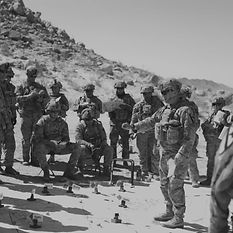About Ian Palmer
Ian Palmer is a retired U.S. Army Colonel with more than 26 years of experience leading organizations in complex, global, and high-stakes environments. He commanded at every echelon from platoon to brigade combat team, culminating in service as Chief of Staff of the III Armored Corps, where he led the synchronization of operations and strategy for a 90,000-person organization across five Army installations. His career included combat tours in Iraq and Afghanistan, advisory and partnership missions across Europe, the Middle East, and Asia, and strategic assignments on the Joint Staff in the Pentagon, where he advised national leaders on global operations. A lifelong leader and mentor, Ian has built teams from the ground up, led organizations through crisis and transformation, and shaped leader development across every level of the Army. He holds graduate degrees from the U.S. Naval War College and LSU, studied as a National Security Affairs Fellow at Stanford’s Hoover Institution, and is grounded in the belief that leadership is earned through trust, service, and leading from a clear sense of purpose.
Why I Lead in Athletics
I’ve loved sports for as long as I can remember.
From the time I was six years old, I played anything I could—soccer, baseball, backyard football, kickball, dodgeball. My first clear sports memory is of watching Dwight Clark make The Catch from Joe Montana, replaying it over and over again in my bedroom. As I grew up, I was constantly in motion: pickup basketball games at the park, neighborhood football games, or sneaking away to catch whatever big game was on TV. I’d check on how the Buckeyes were doing against Chuck Long’s Iowa team, watch Keith Byars run wild across my living room floor, and even rig up a tiny TV in the back of my mom’s van so I wouldn’t miss Bernie Kosar and the Browns stomp the Vikings.
Clearly, I was more than a fan—I saw the world through the lens of sports.
That perspective carried me through my own playing career, through years of football, soccer, and baseball into my teens and early college years. Sports were a stabilizing force for me during some of the most challenging times in my life. When my parents went through a long and difficult divorce, I found belonging and consistency in my teammates. The locker room became a safe place, and the field became a proving ground. Sports were there when not much else was.




After a few Division III football programs showed interest—and after briefly entertaining the fantasy of walking on at Notre Dame as a kicker—my playing career came to an end. But the lessons I learned through sports stayed with me: discipline, teamwork, humility, and the idea that success is best measured by the team’s outcome, not your own. Those lessons shaped me in ways that extended far beyond the field.
When I began my career in the Army—first through ROTC, then as a commissioned officer—I realized how seamlessly those lessons transferred. Leadership in the military looked and felt a lot like leadership in athletics. Both are built on cohesion, culture, discipline, training to standard, developing others, serving others, and winning—whether that victory is on the scoreboard or in accomplishing the mission.
There were moments in my career when I considered leaving the Army, and every time I did, the only thing that ever felt like a real alternative was coaching. The parallels were undeniable. Both worlds demand cohesive cultures made of discipline, accountability, and serving others in the pursuit of victory.
My love for athletics never faded—it evolved. I found new purpose at the intersection of leadership and athletics: helping coaches and teams reach their full potential not just through better strategy, but through stronger culture and leadership.
